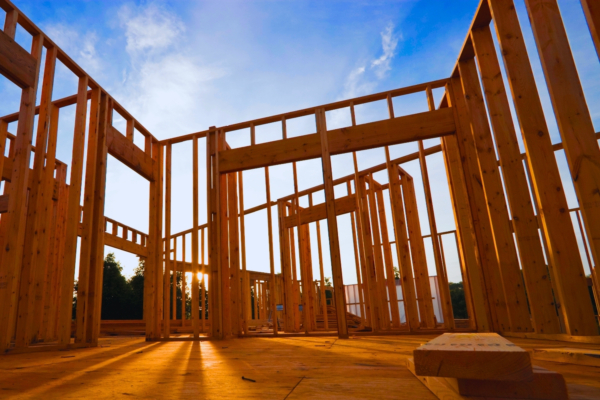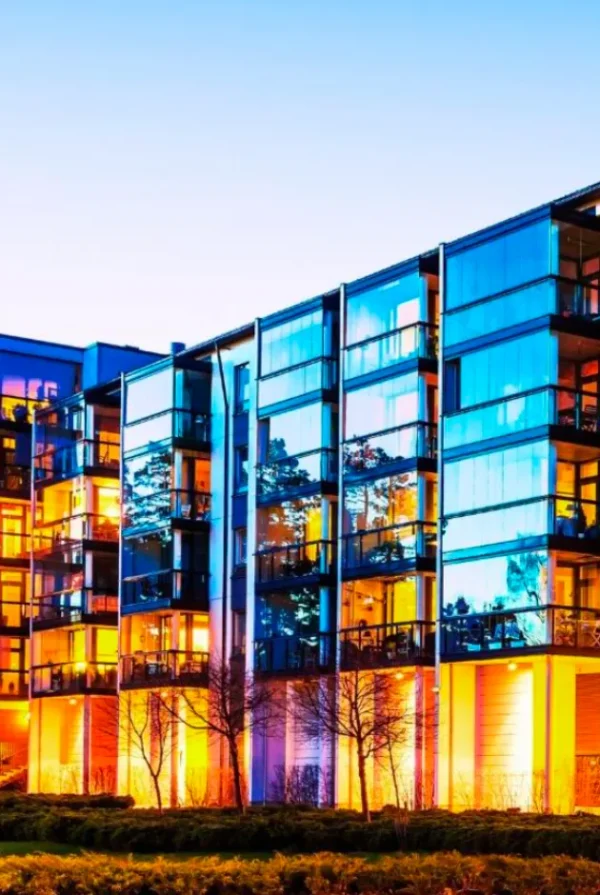
Industry Growth: Speculative Construction

Take a quick glimpse at any real estate or business news publications, and you’ll likely see stories of new speculative developments popping up around the country. Speculative construction has become a hot topic in commercial real estate development with numbers hitting record-breaking highs. According to a 2020 report, over 60% of new industrial construction is speculative.
But what exactly is speculative construction, and why is it drawing in so many developers? In this article, we’ll break down what you need to know, including what speculative construction is, the pros and cons of spec construction, and how to finance a development.
Commercial Lending Solutions
Ready to acquire that next business? Talk to our Commercial team today.
What is speculative construction?
Speculative construction is a term used to describe the process in which land is purchased and a building is constructed with no upfront commitment from any buyers or tenants. This means that the developer constructs a project without a specific end-user in mind with the expectation that the building type and location will attract potential tenants once the construction is completed.
Examples of Speculative Construction
Speculative construction can take many different forms, spanning the residential, commercial, and industrial spheres. Some examples include:
- An office park or building is built with the intention of finding lessees once the project is finished
- A model home is constructed with the goal of selling similar homes to buyers
- A developer purchases land to build new houses that they will sell upon completion
- A commercial building is repurposed into an apartment or condo complex
Speculative developers are careful to plan their projects strategically, but finding tenants after completion is not guaranteed. Speculative construction is riskier than custom construction and carries some different consequences.
Pros and Cons of Spec Building
Like any type of investment, some advantages and disadvantages come with speculative development and construction. Here are the main points to think about.
| Advantages | Disadvantages |
|---|---|
| Profits can be much higher. If an investor plays their cards right by buying land and building when prices are low and selling when prices are high, profits can be higher than in other real estate sectors. | It is riskier overall. Overall, speculative construction is riskier than other types of real estate development since there is no guarantee that the builder will find a buyer. Even speculative projects that appear to be a sure bet can be a bust if the market suddenly experiences a drastic shift. |
| Spec developments can be easier to sell than existing properties. Depending on the market, speculative properties may be far more desirable than the existing properties available for buyers or tenants. New properties typically have fewer problems, newer amenities, and more desirable features. | It can be difficult to find the right tenant or buyer. Though there may be a demand for the type of real estate you are developing, it is not certain that your property will meet the specific needs of buyers or potential tenants in your area. |
| There may be less competition. A lot of homebuyers and businesses want new spaces, but many don’t have the means to go through the custom build process. Speculative construction puts new properties on the market that stand out above the older existing properties for sale or lease. | If you are slow to find a tenant or make a sale, it will eat into your profits. The longer it takes to find someone to fill your vacant property, the more money you lose. For some speculative builders, the properties never see tenants, which may carry consequences like bankruptcy. |
Important Considerations for Speculative Developers
There are several things that a developer should carefully consider and research before diving into speculative construction, including:
- Current and future market conditions
- Competition for similar properties in your local market
- The approval and permitting process
- How much you will need to invest in the property and the potential return on investment
- The timeline of permitting, building, and finding buyers or tenants
Aside from understanding the logistics and researching the likelihood that you’ll make your money back, you should also go into a spec project with a solid financing plan.
How to Finance with Spec Construction Loans
There are a number of ways that speculative developers finance their projects— private investors, non-regulated lenders, and their own cash reserves, just to name a few sources.
However, a construction loan through a commercial lender is one of the most popular ways to finance new development projects. But compared to loans for other types of commercial construction, a speculative loan is more complex, since there are different risks involved.
The exact process for commercial lenders may vary from institution to institution, but the basics should be the same. As with any loan, you’ll need to gather and present your and/or your business’s financial records. You’ll also need to provide information about the land and building you intend to build, including documents like:
- The deed to the property, deed restrictions, and protective covenants
- Blueprints and surveys
- Information about architects, builders, and construction managers
- A budget and list of materials
And remember the things to research that we discussed under the “Important Considerations” section above? All of that information should be organized and presented to a lender. By providing data—not just hopes or guesses— that indicates your property will see a healthy return, you give the lender more reasons to approve your application. Don’t be afraid to build a story with your data and demonstrate how your property will succeed.
Working with a Local Lender
Financing your speculative construction project with a local lender can be very advantageous. Community credit unions and banks have a higher level of expertise when it comes to local markets, which may improve your chances of getting approved. They may also be more inclined to finance a project that would benefit the local area. A local lender’s knowledge of the market can be a valuable resource for predevelopment, permitting, and more.
Speculative Construction Financing at Amplify
No matter what kind of commercial loan or business project you’re undertaking, it’s important to always carefully research market conditions, competition, permitting, project costs, and your timeline before committing to a project. Working with a local lender like Amplify Credit Union can provide you with valuable resources at all stages of construction so your project can go that much smoother.
Looking for a Commercial Loan?
Amplify’s commercial lending team can help you find the right solution for your business.


